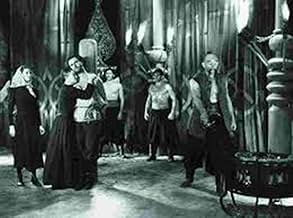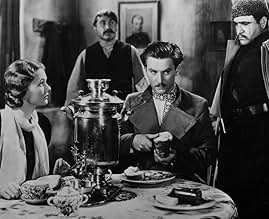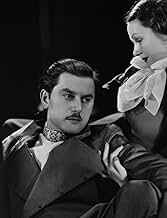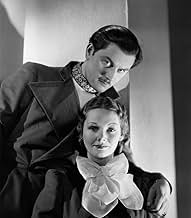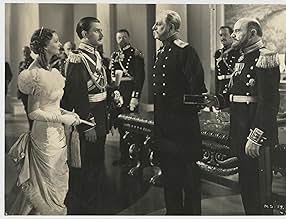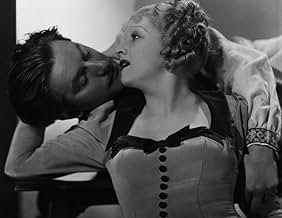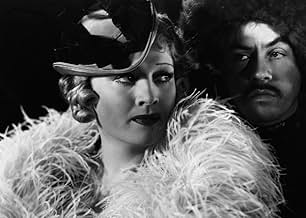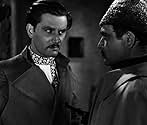अपनी भाषा में प्लॉट जोड़ेंA Russian courier struggles to deliver a message to the troops fighting Tartar invaders.A Russian courier struggles to deliver a message to the troops fighting Tartar invaders.A Russian courier struggles to deliver a message to the troops fighting Tartar invaders.
- पुरस्कार
- कुल 1 जीत
Oscar Apfel
- Tsar's General
- (बिना क्रेडिट के)
Margaret Armstrong
- Gypsy Woman
- (बिना क्रेडिट के)
Matthew Betz
- Chieftain
- (बिना क्रेडिट के)
Ward Bond
- Tartar Guard
- (बिना क्रेडिट के)
Lynton Brent
- Sailor
- (बिना क्रेडिट के)
Leonard Ceeley
- Tsar's Aide
- (बिना क्रेडिट के)
Harry Cording
- Peasant
- (बिना क्रेडिट के)
फ़ीचर्ड समीक्षाएं
THE ADVENTURES OF MICHAEL STROGOFF (aka THE SOLDIER AND THE LADY) is a strange little movie. At first glance it's an American production, but then it turns out to be a version of a French version of a German movie. Confused yet? In essence, lots of footage is taken from the European original(s) with some added-in sub-plots involving a couple of comic relief characters commentating on the action.
The film is a fairly typical swashbuckler for the era, ostensibly based on a Jules Verne story. The fact that it involves the Russian Empire makes for a refreshing change, but otherwise it's business as usual. The bad guys are dastardly and of the moustache-twirling variety while the hero is put through the mill during the course of the production.
There are certainly some rousing bits of spectacle along the way, including well-filmed horse and carriage chases. The ending is inevitably stirring, with a nice twist. Strogoff gets the chance to indulge in some fisticuffs with a bear and is later subjected to a torture scene straight out of a FU MANCHU movie. It's all heavily dated so only those with a nostalgic eye for the era will likely enjoy it.
The film is a fairly typical swashbuckler for the era, ostensibly based on a Jules Verne story. The fact that it involves the Russian Empire makes for a refreshing change, but otherwise it's business as usual. The bad guys are dastardly and of the moustache-twirling variety while the hero is put through the mill during the course of the production.
There are certainly some rousing bits of spectacle along the way, including well-filmed horse and carriage chases. The ending is inevitably stirring, with a nice twist. Strogoff gets the chance to indulge in some fisticuffs with a bear and is later subjected to a torture scene straight out of a FU MANCHU movie. It's all heavily dated so only those with a nostalgic eye for the era will likely enjoy it.
Tsarist courier Michael Strogoff has an important message to deliver to Grand Duke Vladimir. Rebel leader Ivan Ogareff is rampaging in Siberia. Strogoff falls for Nadia. He picks up two comedic reporters and survives Tartar revolt along the way.
There seems to be different versions and this one has been edited from an earlier one. I can't really tell and I don't have the ability to compare any of them. It's a fine action adventure thriller. There is some good action, some really big action. This could be more personal. The big action do take over in the second half.
There seems to be different versions and this one has been edited from an earlier one. I can't really tell and I don't have the ability to compare any of them. It's a fine action adventure thriller. There is some good action, some really big action. This could be more personal. The big action do take over in the second half.
I saw this wonderful film when I was 15 in 1940, a local cinema in Barcelona and still love very much as well as the nostalgia that surrounds those days of black and white film that we like so much. talking about the film in its technical, special effects and perfect interpretation; all area perfect. "I don't know why they are doing chariot races - is nothing these races they made already in the Roman Empire" - commentary between the two journalists in the carriage - the interpretation of Anton Walbrook is memorable, as well as the rest of actors and actresses. scenarios are beautiful even in black and white, great staging of the thousands of extras and the Russian cavalry and tartar. Anton Walbrook in the role of Michael Strogoff is great, as well as Akim Tamiroff in the role of Ogareff, Fay Bainter is exquisite and sweet as the hero's mother, Elizabeth Allan as the girlfriend of Michel Strogoff is so beautiful and sweet as the heroines of those times, finally a great movie that I never tire of seeing and seeing.
There are a number of film adaptations of Jules Verne's most dramatic novel, but this could actually still be the best one, although it is dated and replenished with all the cinematic cliches of the 30s. Unlike the other film versions, there are few deviations from the original here, and those innovations that have been introduced are well made and intriguing. The chief one is the character of Zangarra (Margot Grahame), Ivan Ogareff's seductive partner, who looks through Ogareff, recognises his bad character and transforms her sympathies to Strogoff and accepts the consequences. Akim Tamiroff is splendid as the villainous traitor, he might be the best of all Ogareffs, and Anton Walbrook is perhaps a little too noble for the Strogoff character but acts admirably the whole way, especially during his ordeals. Elizabeth Allan is lovely as Nadia, while she is actually outshadowed by Fay Bainter as the tender mother with a bleeding heart. She is in many ways the most important character of the story, as she brings on the crisis and leads to the fantastic final settlement. The music is also splendid, using Borodin's Polovtsian dances for the most suggestive ballet scene, but the costumes and the crowd scenes in rustic environments really crowns the show. This is great adventure entertainment doing its best in living up to Jules Verne's great novel, and succeeding at large.
I'm giving 6 to this film, well below it's current ranking at IMDb, and just for the powerful scenes that remain in it, from the original French production "Michel Strogoff" aka "Der Kurier des Zaren" (1936), by German director Richard Eichberg. The introduction of two comic-relief characters speaks a lot of the lack of culture, ethics, and common-sense of the American producers who concocted this version, re-issued under a different title yet, in 1945, in which Akim Tamiroff was given first credits - to bank on his 1940 public acknowledgement in "The Way of All Flesh". Speaking of flesh, Michel Strogoff is whip-tortured by Ogareff in front of his mother, and girl friend: first you see his naked torso (from the Franco-German film), and then you see him in tattered shirt (from the American added footage)... As if the Russian outlaws would decide to cover the man's torso after the first set of whip-lashes! Since the earlier film is impossible to view these days, I guess we must put up with this version to have glimpses of the former greatness of battles, horse charges, and human emotions - like that silent suffering mother. A pity Eichberg is not credited for the only good footage in this film.
क्या आपको पता है
- ट्रिवियाRKO bought the rights to the French version Michel Strogoff (1936) for $75,000, and specifically signed its star Anton Walbrook so that they could use some scenes from that movie. About 22 scenes were edited into the new version, including Siberia footage, battle footage, Tartar camps and the river on fire. The Hollywood Reporter mentioned that the new footage shot blended perfectly with the old footage.
- गूफ़When Strogoff is being chased on horseback from Omsk, the horse trips in an open area well within view of those chasing him. Yet just after he falls, he is suddenly in a wooded area and he is able to hide himself as his chasers just ride on past.
- भाव
Cart Driver: I take your money, you take a walk.
Henry Blount: I say, but that's most frightfully one sided.
- क्रेज़ी क्रेडिटOpening credits: 1870 During the reign of Tsar Alexander II, the fate of the Russian Empire was threatened by a great Tartar uprising in Siberia ......
- कनेक्शनEdited from Der Kurier des Zaren (1936)
- साउंडट्रैकGod Save the Tsar
(1833) (uncredited)
(Russian national anthem, 1833-1917)
Music by Alexis Lvov
Variations often in the score
टॉप पसंद
रेटिंग देने के लिए साइन-इन करें और वैयक्तिकृत सुझावों के लिए वॉचलिस्ट करें
विवरण
बॉक्स ऑफ़िस
- बजट
- $4,00,000(अनुमानित)
- चलने की अवधि
- 1 घं 25 मि(85 min)
- रंग
- पक्ष अनुपात
- 1.37 : 1
इस पेज में योगदान दें
किसी बदलाव का सुझाव दें या अनुपलब्ध कॉन्टेंट जोड़ें

